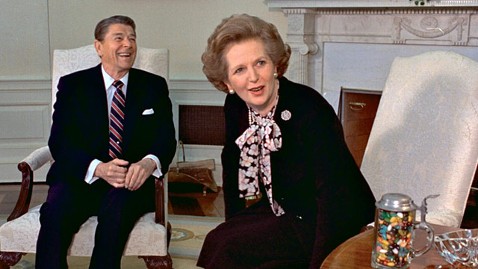Margaret Thatcher: Britain's Most Polarizing PM

J. Scott Applewhite/AP Photo
Margaret Thatcher may have been one of the most important global figures of the twentieth century, but in Great Britain today she is reviled by many who remember her controversial years in power.
Twenty years after she left politics, Thatcher is still a very divisive figure in Britain, idolized by some, and vilified by others.
A Facebook page called "Is Margaret Thatcher Dead Yet?" has received 38,000 "likes" in recent years. The British government's decision to hold a ceremonial funeral with full military honors at St Paul's Cathedral will certainly not be welcomed by everybody.
In the United States, Thatcher was broadly popular, more so sometimes than her American counterparts. At the time of her resignation, in November 1990, 76 percent of Americans in a Gallup poll reported a favorable opinion of her performance as prime minister. In comparison, Ronald Reagan left office in January 1989 with a job approval rating of 64 percent in ABC News/Washington Post polling.
On the world stage Margaret Thatcher was an international celebrity, the first female leader of a major Western democracy, a Cold War hawk who forged a close political and personal relationship with President Ronald Reagan. She was one of the first Western leaders to believe in engagement with Mikhail Gorbachev, and sometimes acted as an intermediary between the Russian leader and Reagan. It was the Soviets who called her the "Iron Lady." It was meant as an insult, but she wore it with pride.
One of the longest-ever serving British prime ministers, she transformed the country, and left it richer and more self-confident than when she took office. As a conservative champion of the free market, she curbed the power of the labor unions, privatized huge swathes of British industry, and deregulated London's financial sector.
But like all revolutions, Thatcherism had plenty of victims. Britain experienced surging unemployment, an increase in economic inequality, and rioting and looting not seen since the Victorian period. Britons still argue passionately over whether the benefits of Thatcherism outweighed the social cost.
Her policies overseas attracted just as much controversy. Despite Britain's victory in the Falklands conflict, Margaret Thatcher's decision to go to war to recapture those strategically unimportant islands 8,000 miles away in the South Atlantic is still seen by some as a reckless gamble.
Thatcher refused to support sanctions against South Africa as a way to end the apartheid regime. She struck a ruthless attitude to IRA hunger strikers (and only narrowly escaped from assassination in 1984). British arms deals to dubious foreign leaders like Indonesia's Suharto, Chile's Pinochet, and Iraq's Saddam Hussein drew fierce criticism from human rights campaigners.
And her personal style alienated many Britons. Didactic, combative, partisan, sometimes even autocratic, Thatcher was certainly no consensus-builder. Even her senior ministers were sometimes treated with open contempt.
Her forcefulness and self-belief were her greatest political strength, but also, in the end, her greatest weakness. Towards the end of Thatcher's time in office, she seemed to many to lose touch with reality. Despite having a healthy majority, she was thrown out of office by her own party, fighting back the tears as she left Downing Street for the last time.